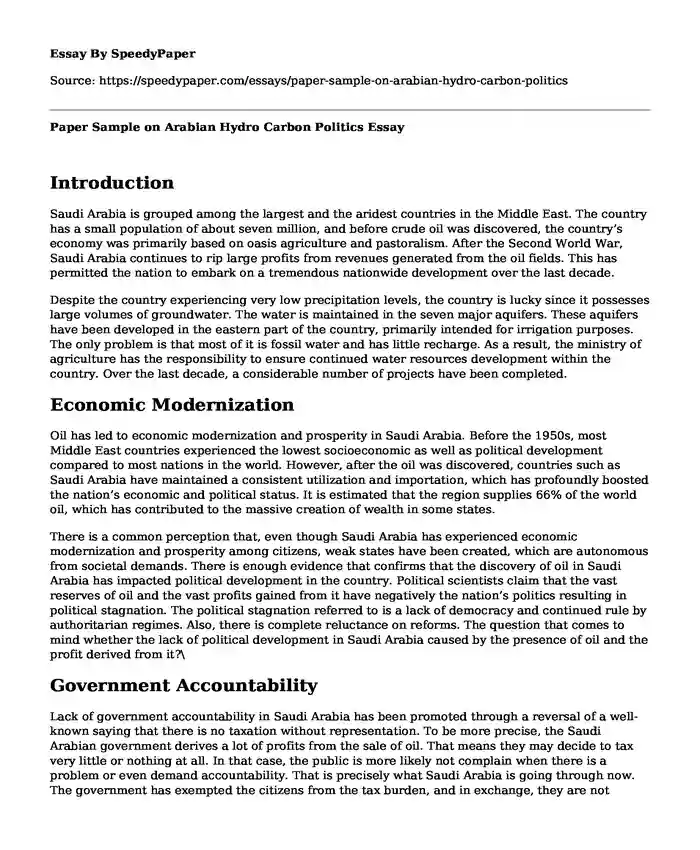
| Type of paper: | Essay |
| Categories: | Politics Government World |
| Pages: | 3 |
| Wordcount: | 702 words |
Introduction
Saudi Arabia is grouped among the largest and the aridest countries in the Middle East. The country has a small population of about seven million, and before crude oil was discovered, the country’s economy was primarily based on oasis agriculture and pastoralism. After the Second World War, Saudi Arabia continues to rip large profits from revenues generated from the oil fields. This has permitted the nation to embark on a tremendous nationwide development over the last decade.
Despite the country experiencing very low precipitation levels, the country is lucky since it possesses large volumes of groundwater. The water is maintained in the seven major aquifers. These aquifers have been developed in the eastern part of the country, primarily intended for irrigation purposes. The only problem is that most of it is fossil water and has little recharge. As a result, the ministry of agriculture has the responsibility to ensure continued water resources development within the country. Over the last decade, a considerable number of projects have been completed.
Economic Modernization
Oil has led to economic modernization and prosperity in Saudi Arabia. Before the 1950s, most Middle East countries experienced the lowest socioeconomic as well as political development compared to most nations in the world. However, after the oil was discovered, countries such as Saudi Arabia have maintained a consistent utilization and importation, which has profoundly boosted the nation’s economic and political status. It is estimated that the region supplies 66% of the world oil, which has contributed to the massive creation of wealth in some states.
There is a common perception that, even though Saudi Arabia has experienced economic modernization and prosperity among citizens, weak states have been created, which are autonomous from societal demands. There is enough evidence that confirms that the discovery of oil in Saudi Arabia has impacted political development in the country. Political scientists claim that the vast reserves of oil and the vast profits gained from it have negatively the nation’s politics resulting in political stagnation. The political stagnation referred to is a lack of democracy and continued rule by authoritarian regimes. Also, there is complete reluctance on reforms. The question that comes to mind whether the lack of political development in Saudi Arabia caused by the presence of oil and the profit derived from it?\
Government Accountability
Lack of government accountability in Saudi Arabia has been promoted through a reversal of a well-known saying that there is no taxation without representation. To be more precise, the Saudi Arabian government derives a lot of profits from the sale of oil. That means they may decide to tax very little or nothing at all. In that case, the public is more likely not complain when there is a problem or even demand accountability. That is precisely what Saudi Arabia is going through now. The government has exempted the citizens from the tax burden, and in exchange, they are not supposed to demand any representation.
The government provides its people the best public goods and services, and they have become politically passive even when they differ with the government's policies. That is because opinions tend to disagree, and there is a need to illustrate different viewpoints when deciding on the best policy advice.
Conclusion
Based on the kind of developments experienced in Saudi Arabia, it is clear that the exploitation of specific resources may quickly determine the kind of government formed and social developments made. Saudi Arabia is among the most developed Middle East countries, and most of the wealth is gotten from oil sales. There is a serious relationship that exists between scientific expertise and governance. For instance, in contemporary societies, all political decisions have to be justified on scientific expertise basis.
Bibliographies
Alshammari, Zeyad Suwailem M. "Political Uprisings and the Arab Monarchies: The Survival of the Saudi Arabia Monarchy." PhD diss., Howard University, 2017.
Jones, Toby. "State of nature: the politics of water in the making of Saudi Arabia." Water on sand: Environmental histories of the Middle East and North Africa (2013): 231-250.
Vitalis, Robert. "Black gold, white crude: An essay on American exceptionalism, hierarchy, and hegemony in the Gulf." Diplomatic History 26, no. 2 (2002): 185-213.
Cite this page
Paper Sample on Arabian Hydro Carbon Politics. (2023, Dec 25). Retrieved from https://speedypaper.net/essays/paper-sample-on-arabian-hydro-carbon-politics
Request Removal
If you are the original author of this essay and no longer wish to have it published on the SpeedyPaper website, please click below to request its removal:
- The American Dream Essay Example
- Comparison and Contrast Essay Sample on Gender Roles in Society
- Essay Sample: Treating Immigrants Like Slaves Should be Abolished
- Essay Example: Performance Management Questions
- The Hidden Faces of Sexual Assault in the Army. Essay Example
- Essay Example: Comparison of Programs in Crime Solution
- U.S. Navy Officer: A Way of Life, Not Just a Job - Essay Sample
Popular categories




